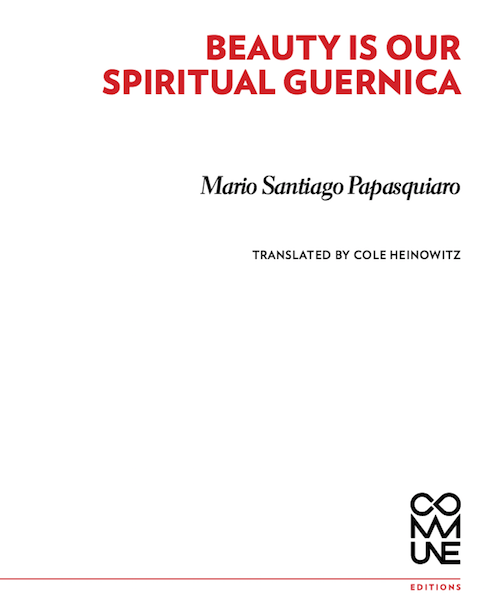Cole Heinowitz Discusses New Translation of Mario Santiago Papasquiaro

Paul Murufas interviews Cole Heinowitz about translating Mario Santiago Papasquiaro! Commune Editions has released a new collection of Mario Santiago’s poetry, Beauty is Our Spirtual Guernica (download it for free here); and Heinowitz has previously translated Advice from 1 Disciple of Marx to 1 Heidegger Fanatic (Wave Books, 2013). Basically, let's read it all. "Santiago was the leading voice of the Infrarealist movement that emerged from Mexico City in the 1970s," writes Murufas. "The poems within are a fitting testament to the bombastic, establishment-scorning artist and his acidic wordplay." More:
PM: When did you first become interested in translating Santiago?CH: I’ve been teaching literature at Bard College for the last 12 years. Five years ago or so, Alexis Graman, a wonderful painter who was in one of my seminars, asked to do a tutorial on Mario Santiago Papasquiaro (aka Ulises Lima, from Roberto Bolaño’s The Savage Detectives). Through Juan Villoro, I made contact with Mowgli Zendejas, Santiago’s son, in Mexico City. He had just returned from studying Buddhism in Japan and was setting up the first free-form radio station in DF. Jeta de Santo, the beautiful posthumous collection of Santiago’s work, had just been published by the Fondo de Cultura Económica. I think Alexis and I managed to buy the last of the original print run. The major bookstores in DF don’t carry it—but they say it’s in stock so Spain doesn’t send them more copies. Alexis and I read and reread it and decided to translate the 1975 poem Santiago launched like a missile on the Mexican literary establishment, Advice from 1 disciple of Marx to 1 Heidegger fanatic. It took us a year to translate. It’s insane.
PM: How did you link up with Commune Editions?
CH: I met Juliana [Spahr] 15 years ago at a party in her backyard, back when she as living in Brooklyn. Five years later, we were on the Poetry Bus together in northern California. Then last year she got in touch to say she’d loved reading Advice and asked if I had other unpublished translations of Santiago’s work—especially any pieces where his politics were in the foreground.
PM: How did you select the various poems and works that make up Beauty Is Our Spiritual Guernica? How did you select the title?
I picked the pieces where Santiago’s engagement with revolutionary politics is the most vivid and direct. The folks at Commune took the title from the poem “Dismirror.” That poem says a lot about Santiago’s radicalism.
Read the full interview at the Web Address of Paul Murufas.


